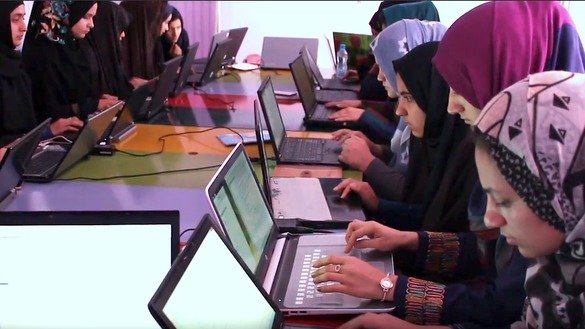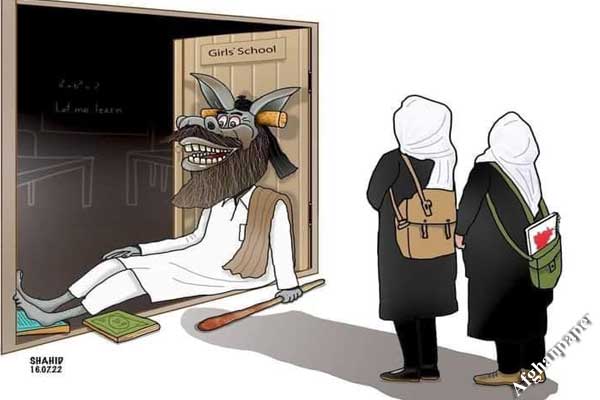 The Taliban has recently shut down fiber optic internet services in several Afghan provinces, including Balkh, Kandahar, Helmand, Herat, Badakhshan, Takhar, KundezZabul, Nimroz, Logar, Paktika, Paktia and Baghlan. This move, ordered by Taliban leader Hibatullah Akhundzada to prevent “immoral activities,” has broad implications for daily life but strikes hardest at women and girls, for whom the internet was the last avenue to education.
The Taliban has recently shut down fiber optic internet services in several Afghan provinces, including Balkh, Kandahar, Helmand, Herat, Badakhshan, Takhar, KundezZabul, Nimroz, Logar, Paktika, Paktia and Baghlan. This move, ordered by Taliban leader Hibatullah Akhundzada to prevent “immoral activities,” has broad implications for daily life but strikes hardest at women and girls, for whom the internet was the last avenue to education.
Context and Official Rationale
Since the Taliban’s return to power in 2021, over 2.2 million girls have been denied secondary and higher education. Women have been barred from universities since December 2022, affecting more than 100,000 young women. In this environment, the internet served as the final tool for online learning, where thousands of girls pursued virtual courses in languages, digital skills, and international university programs. The Taliban justifies the cuts as a measure against immoral content, but critics view it as part of a broader strategy to control information and isolate women.
Real Stories from Girls and Students
Many Afghan girls report that the internet shutdown has extinguished their last hope. For instance, a teenage girl in a video states: “The Taliban has turned Afghanistan into a prison for us,” lamenting nearly four years of school bans. Another young girl says she wanted to fail her class to stay in school, as the Taliban prohibits girls beyond sixth grade. Teacher Parasto Hakim, who runs secret schools, notes: “We opened secret schools as a temporary solution, but four years later, the world has done nothing.”

In addition, girls and students engaged in online university and virtual courses describe their experiences as follows:
– Meena, 15: “Not being able to study feels like a death penalty.” (She and her friends feel lost and confused after school closures and had turned to online education.)
– Yalda, 17: “The Taliban have a strong fear of educated women because they know if a woman gets education, she won’t raise a Talib.” (After the school ban, she turned to self-study with books, a laptop, and mobile, and enrolled in an online program at a prestigious Afghan university.)
– Aliya: “Last year, I enrolled in an online English language program, which was launched by a boy. Then I thought to myself, if he can do it, why can’t I? I learned from his experience and I shaped my idea accordingly.” She also says: “Internet issues in Afghanistan are significant. We are trying to find solutions to minimize this problem.” (At 16, she launched an online academy for over 550 girls and grapples with slow internet speeds.)
– Fatima, 19: “I used to tell my friends to read books, because it had helped me during my helpless days, and I was sure that it would help them to get out of that state of mind, too. Our WhatsApp group was not only a place for telling stories and heartaches but also an educational platform.” (After depression from the bans, she turned to online programs and book reading, launching a reading competition.)
– Toba: “The only thing that encourages us to continue this struggle is the existence of these phones and computers and the Internet. If this space is not there, absolute darkness will rule in our lives.” Also: “In reading Malala’s book, I realized how resilient a girl can be, and naturally, it encourages me and gives me hope to continue fighting until the end.” (Banned from school, she now teaches and learns online, using self-help books for motivation.)
– M.H. (anonymous): “The Taliban ‘decided to withhold our diplomas just because we are women,’ … ‘Now I cannot even apply for any further education because I have no document to prove that I finished my engineering degree.'” Also: “It doesn’t matter to me which country… I just want to go to a better country where at least I have electricity and internet so I can study something and be someone who can contribute to my society.” (Near completing civil engineering, she switched to an online second degree in computer science from a U.S. university.)
– Fariba (name changed): “Sometimes, I wonder how to remain hopeful in these dark circumstances,” … “Nonetheless, I remain hopeful for the future and reassure myself that darkness will end soon, and women and girls in our society will once again access opportunities for work, education and their basic rights.” (She had just started a university degree when campuses closed to women.)

These accounts, drawn from media reports and social media posts, highlight widespread despair.
Social, Psychological, and Economic Ramifications
UNESCO experts warn that these deprivations, beyond lost education, lead to increased depression and isolation. About 78 percent of young Afghan women are not in education, employment, or training—four times the rate for men. The internet cuts limit economic opportunities like freelancing and remote training, perpetuating poverty cycles. Over 90 percent of Afghans support girls’ education, yet Taliban policies ignore this. It also hampers access to medical aid, mental health support, and community connections.
The fiber optic shutdown is not just a technical decision but part of the Taliban’s systematic policies to erase women from educational and social spheres. It closes the last window for online learning and plunges Afghanistan deeper into isolation. The international community must ramp up pressure to restore women’s educational rights—for Afghan girls, these cuts mean the extinguishing of their last light of hope.



